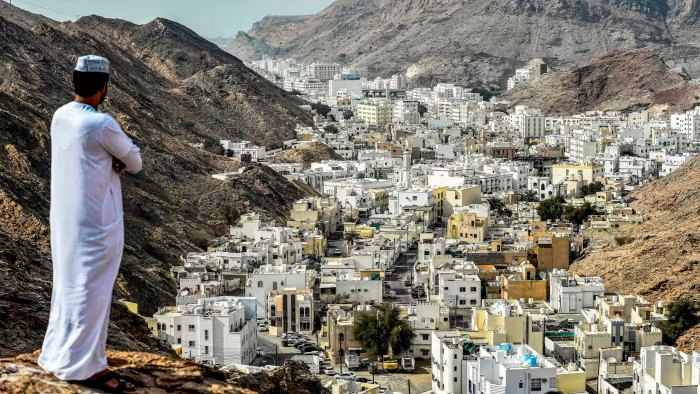In an unprecedented act of violence, six individuals, including four Pakistani nationals and one Indian national, were killed in a shooting near the Imam Ali Mosque in Oman’s capital, Muscat, on July 15, 2024. The Islamic State (IS) militant group has claimed responsibility for the attack, marking its first acknowledged operation within Omani borders. The incident has sent shockwaves throughout the region, raising serious concerns over security and the possibility of extremist groups expanding their reach into areas previously considered safe from terrorism.
The Incident
The assault unfolded in the Al-Wadi Al-Kabir district as worshippers gathered at the Imam Ali Mosque to observe the eve of Ashura, a significant event in the Shia Muslim calendar commemorating the martyrdom of Imam Hussein. According to Omani police reports, three gunmen initiated the attack by opening fire on the congregation, resulting in immediate chaos and panic.
Security forces responded promptly, engaging the assailants and ultimately neutralizing all three. The confrontation led to the deaths of six individuals, including a police officer, and left 28 others injured, encompassing both worshippers and first responders.

Authorities have launched an extensive investigation into the identities and potential affiliations of the attackers. Although IS has claimed responsibility, officials are looking into whether the gunmen had any local support or if they were foreign operatives who infiltrated Oman specifically for this mission.
Victims and Casualties
The Pakistani embassy in Muscat identified the deceased Pakistani nationals as Ghulam Abbas, Hasan Abbas, Syed Qaisar Abbas, and Sulaiman Nawaz. Additionally, the Indian embassy confirmed the death of one Indian national and reported another injured.
The wounded, totaling 28 individuals from various nationalities, were transported to local hospitals for medical attention. Several of the injured remain in critical condition, and medical teams are working tirelessly to provide urgent care. The incident has left the expatriate community in Oman, particularly those from Pakistan and India, deeply distressed and mourning the loss of their fellow citizens.
Government and Diplomatic Responses
Pakistani Prime Minister Shehbaz Sharif expressed profound sorrow over the incident, extending condolences to the victims’ families and instructing the Pakistani embassy in Muscat to provide all necessary assistance to those affected. He affirmed Pakistan’s solidarity with Oman and offered full support in the ongoing investigation.
Similarly, the Indian embassy conveyed its sympathies to the bereaved families and assured cooperation with Omani authorities. Embassy officials visited the injured Indian nationals in hospitals and are facilitating the repatriation process for the deceased.
Islamic State’s Involvement
The Islamic State’s claim of responsibility for this attack is particularly alarming, as it signifies the group’s inaugural operation in Oman. Historically, IS has targeted Shia communities in countries like Iraq, Afghanistan, and Pakistan but had not previously conducted attacks within Omani territory.
This development raises concerns about the group’s expanding reach and the potential for increased sectarian violence in regions previously considered secure. Security analysts warn that IS may be attempting to exploit religious divisions to further its extremist agenda and destabilize yet another Middle Eastern country.
Eyewitness Accounts and Community Impact
Eyewitnesses described scenes of terror as gunfire erupted during the religious gathering. Video footage verified by news agencies depicted worshippers fleeing amidst the chaos, with cries invoking divine protection and lamenting the violence.
The attack has sent shockwaves through Oman’s expatriate communities, particularly among Pakistani and Indian nationals who constitute a significant portion of the country’s workforce. The Imam Ali Mosque, primarily attended by South Asian expatriates, has been a focal point for communal gatherings, and this incident has left the community in mourning.
One survivor, Mohammad Raza, who had been attending the service, recalled the horror: “One moment we were in prayer, and the next, gunfire erupted. People were running in all directions. Some were hit instantly, others tried to help the wounded, but the gunmen showed no mercy.”
Omani Authorities’ Response
The Royal Oman Police have initiated a comprehensive investigation to uncover the motives and affiliations of the perpetrators. In their official statement, they emphasized the importance of relying on information from authoritative sources to prevent the spread of misinformation.
The area surrounding the mosque remains cordoned off as forensic teams collect evidence, and security measures have been heightened across the capital to prevent potential follow-up attacks. The Omani government has also increased security presence at religious sites, public gatherings, and other potential high-risk locations.
Regional Stability and Security Implications
Oman has long been regarded as a bastion of stability in the Middle East, often acting as a mediator in regional conflicts. This attack challenges that perception and underscores the pervasive threat posed by extremist groups like IS. The incident may prompt Omani authorities to reassess their internal security protocols and collaborate more closely with international partners to counteract the spread of radical ideologies.
Counterterrorism experts suggest that Oman will likely strengthen its intelligence-sharing initiatives with neighboring countries, particularly the United Arab Emirates and Saudi Arabia, in an effort to prevent future attacks. The nation may also look to the United States and European allies for strategic support in monitoring extremist activities in the region.
International Reactions
The international community has widely condemned the attack. The United States Embassy in Muscat issued a security alert, advising vigilance and announcing the cancellation of visa appointments in the immediate aftermath. Regional powers and global organizations have expressed solidarity with Oman, denouncing the violence and calling for collective efforts to combat terrorism.
United Nations Secretary-General António Guterres issued a statement condemning the attack and urging nations to strengthen their counterterrorism efforts. “This senseless act of violence must not go unanswered. The global community must stand united in the fight against extremism.”
Conclusion
The tragic events at the Imam Ali Mosque have cast a somber shadow over Oman, a nation unaccustomed to such acts of terror. As authorities delve deeper into the investigation, the resilience and unity of Oman’s diverse communities will be pivotal in healing and fortifying the nation’s commitment to peace and security.
While this attack represents a significant security breach, it also serves as a wake-up call for Omani officials and regional leaders to reinforce counterterrorism strategies. For now, families of the victims mourn their loved ones, hoping that justice will be served and that such atrocities will never be repeated.


